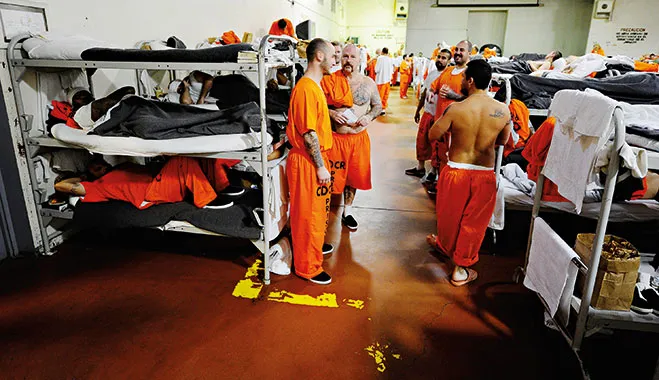
Hundreds of transgender inmates in federal prisons are living in fear following a sweeping executive order signed by President Donald Trump on his first day in office. The order mandates that federal prisons house inmates based on their sex assigned at birth, effectively reversing policies that allowed transgender prisoners to be placed in facilities aligning with their gender identity.
Lawyers and advocates have condemned the move, warning that it puts transgender prisoners in extreme danger. Attorney Moira Meltzer-Cohen, who represents transgender inmate Donna Langan, described the situation as life-threatening.
“It’s going to be incredibly dangerous,” Meltzer-Cohen told DailyMail.com, fearing a potential “bloodbath” if transgender women are forced into men’s prisons.
Langan, a convicted bank robber and former member of the neo-Nazi Aryan Republican Army, underwent a sex change while in federal custody. She and other transgender inmates are now facing imminent transfer to male prisons under the new policy.
The order, which states that the government will recognize only two sexes—male and female—applies to federal prisons, migrant shelters, and rape crisis centers. It eliminates funding for gender transition services and directs agencies to stop using the term “gender” in favor of “sex.”
Public defenders are scrambling to challenge the order in court. Sandra Gant, a federal public defender, revealed that one of her transgender clients in Minnesota has already been segregated and is awaiting transfer.
“She is terrified,” Gant wrote in a legal alert seeking advice from other lawyers and civil rights groups like the ACLU.
Despite backlash from LGBTQ advocates, some inmates have welcomed the order. Rhonda Fleming, a female prisoner who previously sued to have transgender women removed from her facility, argued that their presence created an unsafe environment for biological women. She claimed some male inmates were falsely identifying as transgender to transfer to women’s prisons.
Lawyers for transgender prisoners warn that placing them in male facilities will make them targets for violence. Trey Flynn, representing 42-year-old trans inmate Tomas Ziupsnys, said his client is “terrified” of returning to a men’s prison after undergoing gender-affirming surgery.
“Trans inmates will have targets on their backs,” Flynn said, predicting increased risks of sexual violence and harassment.
A federal prison official admitted that the Bureau of Prisons (BOP) is still determining how to handle transgender inmates who have already undergone sex reassignment surgery. While they are currently being separated, no decision has been made on their permanent placement.
The policy on transgender inmates is just one of 26 executive orders Trump signed within hours of taking office, rolling back numerous Biden-era policies on gender identity, climate change, and racial equity.
Legal experts predict a fierce legal battle, with civil rights groups like the ACLU expected to challenge the order in court. While Congress could theoretically block Trump’s policies, the Republican majority in both the House and Senate makes such opposition unlikely.
As the fallout continues, transgender inmates across the country remain in limbo, facing uncertain futures in a prison system that no longer recognizes their gender identity.








